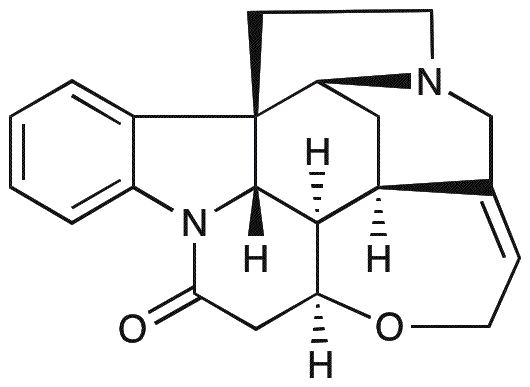Strychnine is widely utilized in research focused on:
- Neuroscience Research: Strychnine is often used as a tool to study neurotransmitter systems, particularly the glycine receptor. Its ability to block these receptors helps researchers understand their role in motor control and sensory processing.
- Pest Control: In agriculture, strychnine has been historically used as a rodenticide. Its effectiveness in controlling pest populations makes it valuable for maintaining crop health, although its use is now highly regulated due to safety concerns.
- Pharmacological Studies: The compound serves as a reference standard in pharmacological research, helping scientists to develop and test new drugs that target similar pathways, particularly in the central nervous system.
- Toxicology Testing: Strychnine is used in toxicology to study poisoning effects and to develop antidotes. Understanding its toxicological profile aids in creating safety guidelines for handling similar compounds.
- Forensic Science: In forensic investigations, strychnine can be analyzed in biological samples to determine poisoning cases. Its distinct chemical properties allow for reliable detection methods in toxicology labs.
General Information
Properties
Safety and Regulations
Applications
Strychnine is widely utilized in research focused on:
- Neuroscience Research: Strychnine is often used as a tool to study neurotransmitter systems, particularly the glycine receptor. Its ability to block these receptors helps researchers understand their role in motor control and sensory processing.
- Pest Control: In agriculture, strychnine has been historically used as a rodenticide. Its effectiveness in controlling pest populations makes it valuable for maintaining crop health, although its use is now highly regulated due to safety concerns.
- Pharmacological Studies: The compound serves as a reference standard in pharmacological research, helping scientists to develop and test new drugs that target similar pathways, particularly in the central nervous system.
- Toxicology Testing: Strychnine is used in toxicology to study poisoning effects and to develop antidotes. Understanding its toxicological profile aids in creating safety guidelines for handling similar compounds.
- Forensic Science: In forensic investigations, strychnine can be analyzed in biological samples to determine poisoning cases. Its distinct chemical properties allow for reliable detection methods in toxicology labs.
Documents
Safety Data Sheets (SDS)
The SDS provides comprehensive safety information on handling, storage, and disposal of the product.
Product Specification (PS)
The PS provides a comprehensive breakdown of the product’s properties, including chemical composition, physical state, purity, and storage requirements. It also details acceptable quality ranges and the product's intended applications.
Certificates of Analysis (COA)
Search for Certificates of Analysis (COA) by entering the products Lot Number. Lot and Batch Numbers can be found on a product’s label following the words ‘Lot’ or ‘Batch’.
Número de catálogo
Número de lote/lote
Certificates Of Origin (COO)
This COO confirms the country where the product was manufactured, and also details the materials and components used in it and whether it is derived from natural, synthetic, or other specific sources. This certificate may be required for customs, trade, and regulatory compliance.
Número de catálogo
Número de lote/lote
Safety Data Sheets (SDS)
The SDS provides comprehensive safety information on handling, storage, and disposal of the product.
DownloadProduct Specification (PS)
The PS provides a comprehensive breakdown of the product’s properties, including chemical composition, physical state, purity, and storage requirements. It also details acceptable quality ranges and the product's intended applications.
DownloadCertificates of Analysis (COA)
Search for Certificates of Analysis (COA) by entering the products Lot Number. Lot and Batch Numbers can be found on a product’s label following the words ‘Lot’ or ‘Batch’.
Número de catálogo
Número de lote/lote
Certificates Of Origin (COO)
This COO confirms the country where the product was manufactured, and also details the materials and components used in it and whether it is derived from natural, synthetic, or other specific sources. This certificate may be required for customs, trade, and regulatory compliance.


